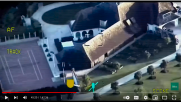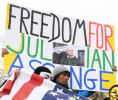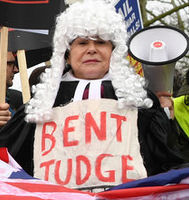Kim Dotcom: The Most Wanted Man Online (True Crime Documentary)
 What can we learn by contrasting Kim Dotcom's experience fighting extradition to the US with Julian Assange's? Watch this fascinating documentary and think about it.
What can we learn by contrasting Kim Dotcom's experience fighting extradition to the US with Julian Assange's? Watch this fascinating documentary and think about it.
 What can we learn by contrasting Kim Dotcom's experience fighting extradition to the US with Julian Assange's? Watch this fascinating documentary and think about it.
What can we learn by contrasting Kim Dotcom's experience fighting extradition to the US with Julian Assange's? Watch this fascinating documentary and think about it.
Previously published as Re: Assange (28/2/20) | RT CrossTalk, Podcast: https://soundcloud.com/rttv/re-assange?in=rttv/sets/crosstalk-1.
In London, Julian Assange is in court to decide whether he will be extradited to the US to face espionage charges. The stakes could not be higher. Assange's liberty, even life, is on the line. Freedom of speech is also on trial – though you wouldn't know that from the mainstream media. This is a Crosstalking debate featuring Joe Lauria, Taylor Hudak, and Alexander Mercouris, who have all been attending protests outside the courts where a kangaroo trial is being staged for Julian Assange.

 Day four of Julian Assange’s extradition hearing saw lawyers discussing whether international law supersedes English law and a dramatic rejection by the judge of a simple request for Assange to be allowed to sit with his lawyers. [This article first published at https://www.rt.com/uk/481823-assange-judge-denies-bench-lawyers/ on 27 February 2020 at 8pm.].
Day four of Julian Assange’s extradition hearing saw lawyers discussing whether international law supersedes English law and a dramatic rejection by the judge of a simple request for Assange to be allowed to sit with his lawyers. [This article first published at https://www.rt.com/uk/481823-assange-judge-denies-bench-lawyers/ on 27 February 2020 at 8pm.].

Snowy and wet weather didn’t deter the WikiLeaks founder’s supporters who gathered outside the Woolwich Crown Court and could again be heard inside the courtroom itself.
It was expected that the day would begin with Judge Vanessa Baraitser considering an application by the defense for Assange to sit on the benches with his lawyers, rather than in the glass-fronted dock where he has been so far, flanked by security guards, and unable to communicate with his team or hear proceedings properly.
Instead, however, the court offered Assange headphones to help him hear. He took the headset and Edward Fitzgerald QC for the defense said they would “give it a try” but he would need to be “glued to the mic” to ensure Assange could hear him and it may not be a proper solution.
It was not the last that was heard of the issue, which blew up dramatically later in the day.
Legal arguments kicked off with James Lewis QC for the prosecution rehashing points made on Wednesday that English law contains no exception to extradition for “political offenses” and that this trumps international law. On the contrary, the defense has argued that a 2003 US-UK extradition treaty (along with a slew of other treaties and international conventions), do prevent extradition for political offenses — and that this is more relevant.
Lewis argued that Fitzgerald was trying to introduce an exception through the “backdoor” and subverting the intention of parliament. He also argued that “political offenses” would need to mean Assange explicitly aimed to overthrow the US government or incite a change in policy — and said it was not clear that this was the whistleblower’s goal when he leaked information.
Lewis also reiterated his argument from Monday’s hearing that Assange was not being prosecuted for leaking information to the media, but for putting “lives at risk.” The prosecution has not, however, been able to prove that any lives were actually lost due to WikiLeaks’ actions — and the defense has, over the past three days, made a thorough case that Assange went to great lengths to redact documents, even warning the US government directly when other actors were about to dump unredacted versions online.
Alice in Wonderland world’
Fitzgerald rose for the defense just before midday. Lewis, he said, was going “too far” to suggest that the bilateral treaty between the US and UK had no legal significance — particularly since the treaty itself is the basis for the US’s extradition request. The defense accepted that the extradition treaty is not domestic law, but said the European Convention on Human rights is. At this point, Judge Baraitser asked Fitzgerald if he was just arguing “in circles.”
He said the court would be in a “pretty strange Alice in Wonderland world” if the treaty that gave rise to the extradition request supposedly had nothing to do with the legality of it.
He argued that the US was engaging in “abuse of process” with the extradition request and that the courts had the powers to rule on that. He pointed to a previous case wherein the US tried to extradite a US citizen on tax evasion charges and it was denied on “abuse of process” grounds.
Asked by the judge why he believes Assange was seeking a change in US government policy rather than simply exposing government wrongdoing, Fitzgerald asked “what other goal” could there have been, other than a change in policy? He said WikiLeaks’ actions were explicitly designed to change White House policy in places like Iraq and Afghanistan.
After a long lunch break, Mark Summers QC rose for the defense and told the court that the headset Assange had been given was not a solution to the problem of him being unable to hear and communicate with his team. This sparked a heated back and forth between Summers and Judge Baraitser.
Summers argued that the glass dock in which Assange was sitting presented numerous logistical issues and cited a report which concluded that such enclosures interfere with the right to a fair trial. He said the presence of mics and US personnel in the courtroom also made it impossible to communicate privately.
Judge Baraitser said she was willing to offer frequent breaks for Assange to confer with his team, but Summers did not accept this as a solution, saying it was “not practical” to stop proceedings “every three minutes” and that it was normal practice around the world — and in the UK — for a prisoner to be allowed sit and confer with lawyers.
Hostile to the defense’s concerns, the judge accused Summers of exaggerating and said that if a three-week hearing planned for May-June needed to become a six-week hearing, “so be it.”
The drama prompted Assange himself to rise from his seat to complain further. Judge Baraitser warned him to sit back down and speak through his lawyers. “I can’t,” he said. She told him to put his hand up if he wanted to attract the attention of his team, but Summers complained that since Assange was behind him, he couldn’t see when he had his hand up.
Even when reminded of Assange’s “particular vulnerability” and mental health issues, Baraitser did not back down, and ultimately refused the request for him to leave the dock. Somewhat surprisingly, the US prosecution maintained a “neutral” approach and did not object to the prospect of Assange sitting with his lawyers — but it made no difference.
Following some brief discussion about upcoming hearing dates, the court adjourned just before 3pm. It is now expected to resume for a case management hearing on April 7.
This video is from the 26 February episode of Afshin Rattansi's show, Going Underground. On this episode of Going Underground, Afshin Rattansi speaks to CIA Whistle-blower Jeffrey Sterling, who was convicted for revealing details about Operation Merlin. He discusses the extradition trial and persecution Julian Assange is facing, his own experience of being prosecuted for whistleblowing on circumstantial evidence, whether the Wikileaks founder will face a fair trial in Virginia, his experiences of racism with the CIA, his advice for other potential whistle-blowers and more!
Other recent articles on CanDoBetter about Julian Assange:
Julian Assange is Guilty Only of Revealing the Evil Soul of the US Empire (17/4/19), Video: Crosstalk- "Free speech threatened" Political, legal concepts & ramifications of Assange case (17/4/19), Explainer: what charges does Julian Assange face, and what’s likely to happen next? Article by Holly Cullen (13/4/19), Canadian Peace Alliance Statement on the Arrest of Julian Assange (12/4/19), Australian Government silent as Julian Assange manhandled out of Ecuadorian Embassy by London Police (11/4/19), Video: People power delays Ecuador's asylum betrayal of Julian Assange (9/4/19), An Open Letter to Prime Minister Scott Morrison: Please use the powers vested in you to end Julian Assange's cruel ordeal (7/4/19), Shame on Australia! French Assange protest outside Australian embassy, Paris (6/4/19), Censorship: Are we all still Charlie Hebdo? Christchurch and Julian Assange (6/4/19), You can help make the Australian Government act to free Julian Assange (5/4/19).

After six and a half years illegal detention, the courageous and visionary Australian journalist Julian Assange, founder of the Wikileaks news service, has had his asylum inside the London Ecuadorian Embassy revoked and has been arrested by the British police to face trial for skipping bail back in 2012, a charge which he could only be jailed for a few years at most. However, there remains a serious risk that the United States could seek to have Julian Assange extradited to face, in its rigged judicial system, charges which have suspiciously remained secret until now: helping whistleblower Chelsea Manning crack a password to leak classified US documents.
See SEP (Australia) rallies demand freedom for Julian Assange (13/4/19) | WSWS for report of protest of Friday 12 April. -17/4/19: Protest Friday 4pm Victorian State Library in Melbourne and at 1pm in Martin Place, Sydney for Julian Assange: Bring yourself, friends, placards and any literature you may have to inform members of the public of why they need to act to help prevent the deportation to the United States, of Julian Assange, who is not even a United States citizen and has never been there!
On 5 February 2016 the United Nations Working Group on Arbitrary Detention found that Julian Assange had effectively been held in arbitrary detention inside the London Ecuadorian Embassy since October 2012 when he had first been granted political asylum there. This finding was reaffirmed in November 2016.
From October 2012 until May 2016, Julian Assange had been effectively in detention because the British government intended to allow Sweden to extradite him for ‘questioning’ - not to charge him - over rape allegations dating back to 2010. Had the Swedish government given an undertaking not to allow the US to extradite him, Julian Assange would have readily agreed to travel to Sweden, but the Swedish government refused to give such a guarantee.
The Swedish government also refused requests by Julian Assange to be interviewed inside the embassy. Only in May 2017, after the findings of the United Nations Working Group on Arbitrary Detention were published, did a Swedish prosecutor finally make the effort to interview Assange inside the embassy. As a consequence, the prosecutor was forced to admit that Assange was not guilty of rape. Clearly the rape allegations were, just as Julian Assange had feared from the outset, a cynical ploy by ‘neutral’ Sweden to grab him, them hand him across to the U.S.
After Assange had been cleared of the Swedish rape allegations, British Prime Minister Cameron decided to issue the warrant to arrest him for the trivial charge of skipping bail back in 2012, after he had clearly endured far more incarceration than such a trivial offence could warrant. As the Swedish government did before him, Cameron refused to give an undertaking not to allow the U.S. to extradite him.
This arbitrary detention, now for six and a half years, is clearly illegal under international law and a denial of basic human rights to a man whom the Australian Federal Police had found in 2010 had committed no crime.
This is also a test-case of the Australian Government's respect and care for its citizens. It should have acted immediately to end Australian citizen Assange's illegal incarceration. It should have long ago demanded of the British and Swedish governments to guarantee not to allow Julian Assange to be extradited by the US to face the same fate of other courageous whistleblowers, including US Army Private Chelsea Manning and John Kiriakou, formerly of the CIA.
Had such a guarantee not have been given, the Australian Government should have dispatched to London a contingent of Australian Federal Police to escort Julian Assange back to Australia.
Even now, it is not too late to act. As Assange has already served far more detention than is warranted by the charge of skipping bail, he should be released no sooner than when he is sentenced the court. After that the Federal Police should escort him to Heathrow Airport thence back to Australia.
Attend the protest today (Friday 12 April) at 4:00pm at the State Library to demand the Australian government act;
Talk to friends and family about Julian Assange;
Ask your federal member, whether Government or Opposition, why he/she has failed to act in all this time to uphold international law in regard to Julian Assange;
Ask each candidate seeking your vote at the federal elections on 18 May, what he/she intends to do for Julian Assange if elected. Give your highest preference to those who give the best responses.
/2019_FederalElectionPolicies#julianAssange
/JulianAssange
https://twitter.com/JulianAssange_
https://twitter.com/wikileaks
12/04/19
Recent comments